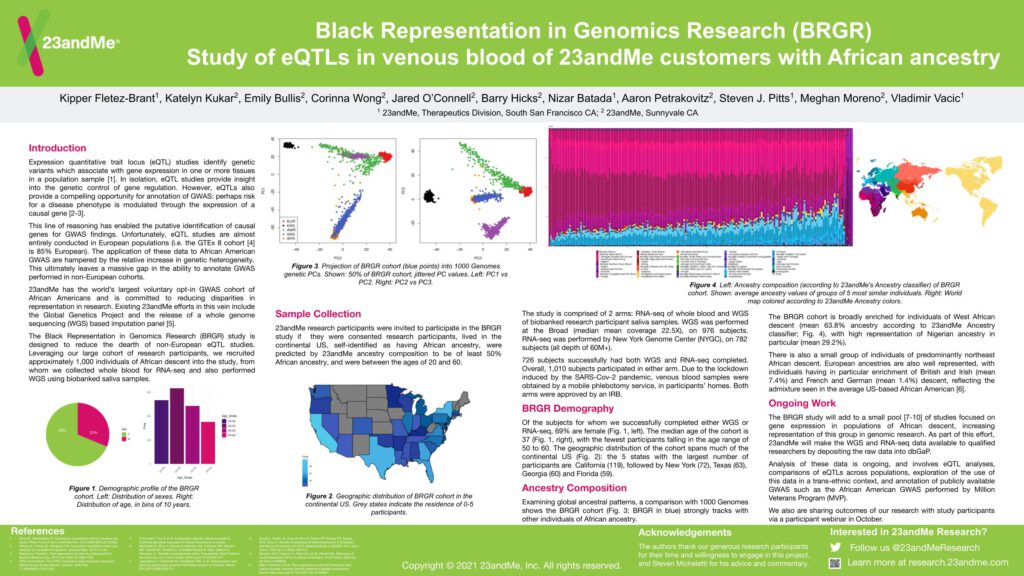23andMe scientists recently shared some encouraging preliminary findings with participants in our Black Representation in Genomic Research study. The study is meant to help accelerate scientific discoveries and medical insights that directly benefit the Black community.
The scientists digging into the data believe these early findings offer encouraging signs that their work will indeed help alleviate some of the massive disparities in health and genetic research in non-European populations. The study itself is part of an on-going effort by 23andMe to improve diversity in research. That’s crucially important, according to speakers during the webinar.
“It’s knowledge that could help level the playing field,” said John Carpten, Ph.D., a Professor and Chair of Translational Genomics, as well as the Director of the Institute of Translational Genomics.
The Important of Diversity in Research
Professor Carpten was one of three outside scientists participating in the webinar. The other speakers included Carlos Bustamante, Ph.D., a professor at Stanford University. He is an internationally recognized leader in applying data science and genomics technology to problems in medicine, agriculture, and biology. Also among the speakers was Eimear Kenney, Ph.D., the founding Director of the Institute for Genomic Health and Associate Professor of Medicine and Genetics at Mount Sinai. She leads research at the interface of genomics, medicine, and computer science.
They each noted the importance of diversifying genetic research and participation to ensure that all people, no matter their ethnicity, benefit from medical and scientific breakthroughs.
A Lack of Representation in Resarch
There is still much to be done, however. One estimate in 2018 found that 78 percent of genome-wide association studies contained data from people only of European descent. The lack of data from non-Europeans, especially those of African descent, leads to less effective treatments for members of the Black community. Over the last decade, 23andMe has taken steps to improve the diversity of our research. Whether through the Roots into the Future Project, the African Genetics Project, or African American Sequencing Project, each project was meant to enhance the diversity in our research and our product.
23andMe’s Black Representation in Genomic Research is another step in that journey. It will offer a way to include underrepresented populations in crucial medical research so that they too can benefit from those breakthroughs.
The Black Representation in Genomic Research Study
As part of this study, 23andMe recruited more than 1,000 people with African ancestry who consented to participate in research. The median age of participants is 37. Most of those who participated were in New York, California, Texas, Georgia and Florida. In addition about 69 percent were women, and most of those who participated had West African ancestry. The study involved using whole-genome and RNA sequencing data to study gene expression in people with African ancestry. This kind of “functional data” is crucial for understanding the significance of genetic variants identified through genome-wide association studies that, in turn, can help in developing treatments for diseases.
Unfortunately, because of the lack of representation in current research, there is not much gene expression reference data for people of African ancestry. The Black Representation in Genomic Research study is an effort to change that. And ensure that the Black community can benefit from scientific discoveries and drug development. The anonymized data from this study will help not just 23andMe researchers but also other academic researchers through the National Institutes of Health’s dbGaP.
Sharing Preliminary Study Findings
The webinar held earlier this Fall was an effort to share with those participating in the research some of what our scientists have learned so far and to answer their questions.

Kipper’s poster presented during American Society of Human Genetics, showing some of the preliminary data from the BRGR study.
23andMe computational biologist Kipper Fletez-Brant, Ph.D., one of the 23andMe scientists working on the study, also spoke during the webinar.
23andMe now has one of the largest genetic research datasets for people of African ancestry in the world. While we still need to improve representation in our research data, that large dataset allows 23andMe to bring new insight into research specific to people of African ancestry.
The effort is important for a number of reasons, and Kipper gave the example of how different conditions — certain cancers, diabetes, and asthma, for example — impact people of African ancestry differently. Some of those differences are due to environmental and social differences but genetics may also play a role, Kipper said. In addition, certain medications may also be more or less effective in people of African ancestry because of those differences. He said that studies like the Black Representation in Genomic Research that look at functional data will help better understand those differences.
A description of the BRGR study will also be presented at the upcoming annual meeting of the American Society of Human Genetics.